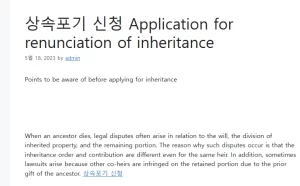Points to be aware of before applying for inheritance

When an ancestor dies, legal disputes often arise in relation to the will, the division of inherited property, and the remaining portion. The reason why such disputes occur is that the inheritance order and contribution are different even for the same heir. In addition, sometimes lawsuits arise because other co-heirs are infringed on the retained portion due to the prior gift of the ancestor. 상속포기 신청
And on the other hand, it is worth noting that if the debts of the ancestor are greater than the assets of the heir, disputes may arise with the creditors as well. Therefore, if your liabilities are greater than your assets, you can choose between an application for limited approval or an application for waiver of inherited property. 좋은뉴스
If the relevant procedures are carried out within the statutory deadline, debt inheritance can be avoided. For example, financial assets, land assets, as well as debts such as taxes and debts must be checked first before deciding whether to approve or give up inheritance.
If an heir decides to apply for limited acceptance or abandonment of inherited property, he or she must submit the relevant documents within 3 months from the date on which he or she becomes aware of the commencement of inheritance, and if the court approves, the debt may be repaid within the limit of the inherited property or retroactively. are considered non-heirs.
It should be noted that if limited approval or renunciation is not given within 3 months from the date on which the commencement of inheritance is known, it may be subject to simple approval. In general, when the property of the heir is not clear, there are cases where the first-order co-heir proceeds with limited acceptance and the second-order heirs apply for the renunciation of inherited property. no.
For example, heirs are expected to pay their debts only to the extent of their inherited property through qualified acceptance, but sometimes taxes that should have been levied on the decedent may be charged to the heirs.
Therefore, an appropriate choice must be made between the application for limited approval and the application for waiver of inherited property.
Mrs. A figured out her inheritance when her husband died. As a result, she found out that her husband had a lot of debt and applied for abandonment of the inheritance. However, Mr. A misunderstood that the inheritance was abandoned because he submitted the application documents, but in fact it was not.
If the court disposes of the inherited property without a decision to give up the inheritance, it is considered a limited acceptance and may have to succeed to all debts. Without knowing this fact, Mr. A uses the money from the disposal of her husband’s property for personal use. did.
Later, when the husband’s creditors found out about these facts, they demanded that he repay the debt against Mr. A. Then, Mr. A refuted that there was no need to repay the debt because he was just proceeding with the inheritance renunciation procedure without knowing the relevant laws and precedents.
The creditors who received these answers file a lawsuit, arguing that Mr. A’s act of disposing of her husband’s property and using it personally was a simple approval of inheritance.
The court hearing the case ruled that it was true that Mr. A had applied for the renunciation of inheritance, but that it should be regarded as simple approval because he had disposed of her husband’s property before the court’s decision. Therefore, the court sentenced Mr. A to succeed to all of her husband’s debts and to repay her debts.
If you are not familiar with the law like this, problems may arise due to unexpected circumstances, so confirm the details of the ancestor’s property in detail accompanied by a lawyer who has legal knowledge in the field of inheritance and submit the reason for giving up inheritance in writing to the court I can try it.
When the court’s decision comes out, it is possible to proceed with the waiver process by sending the decision and confirmation certificate to the creditor.